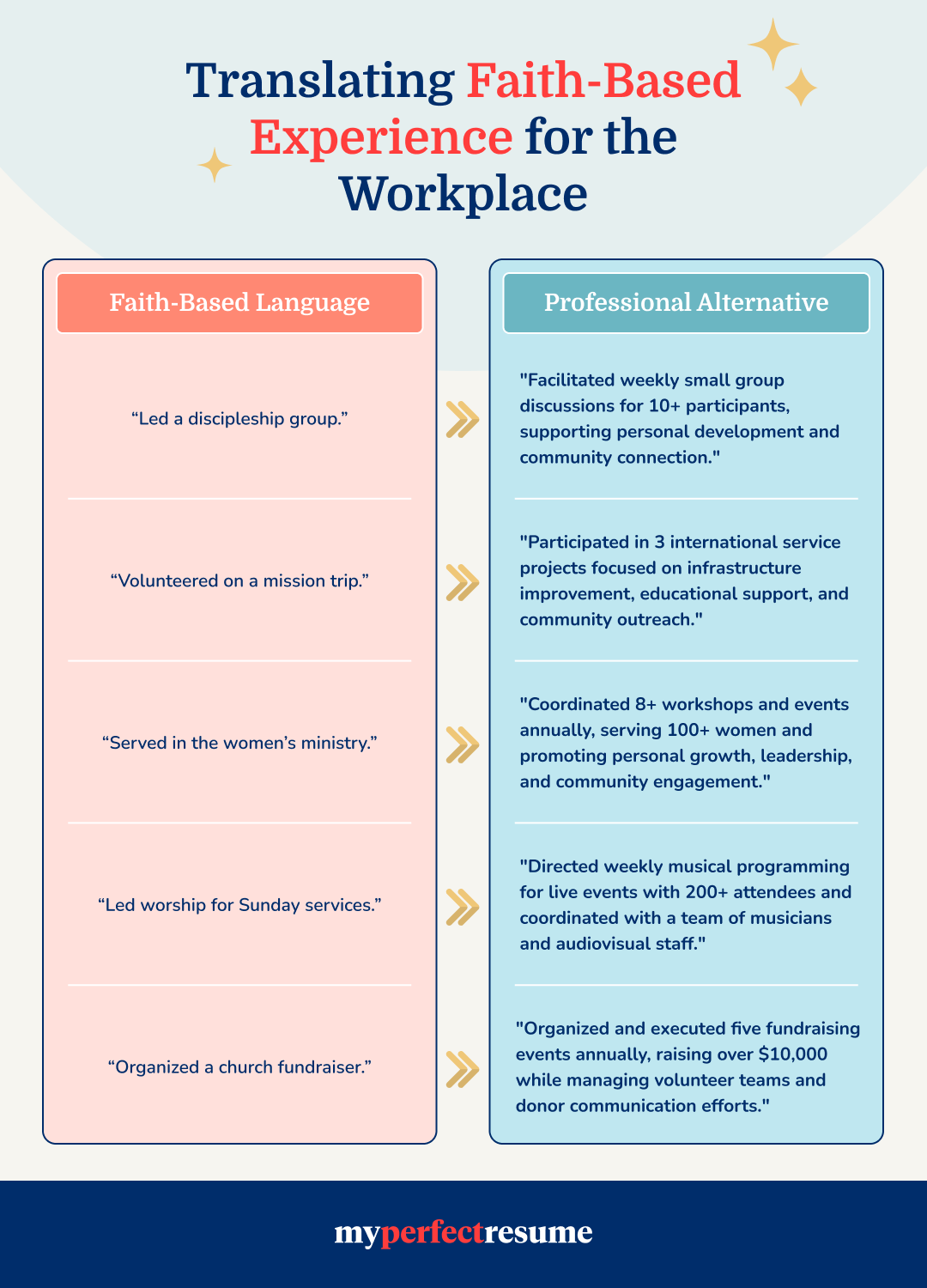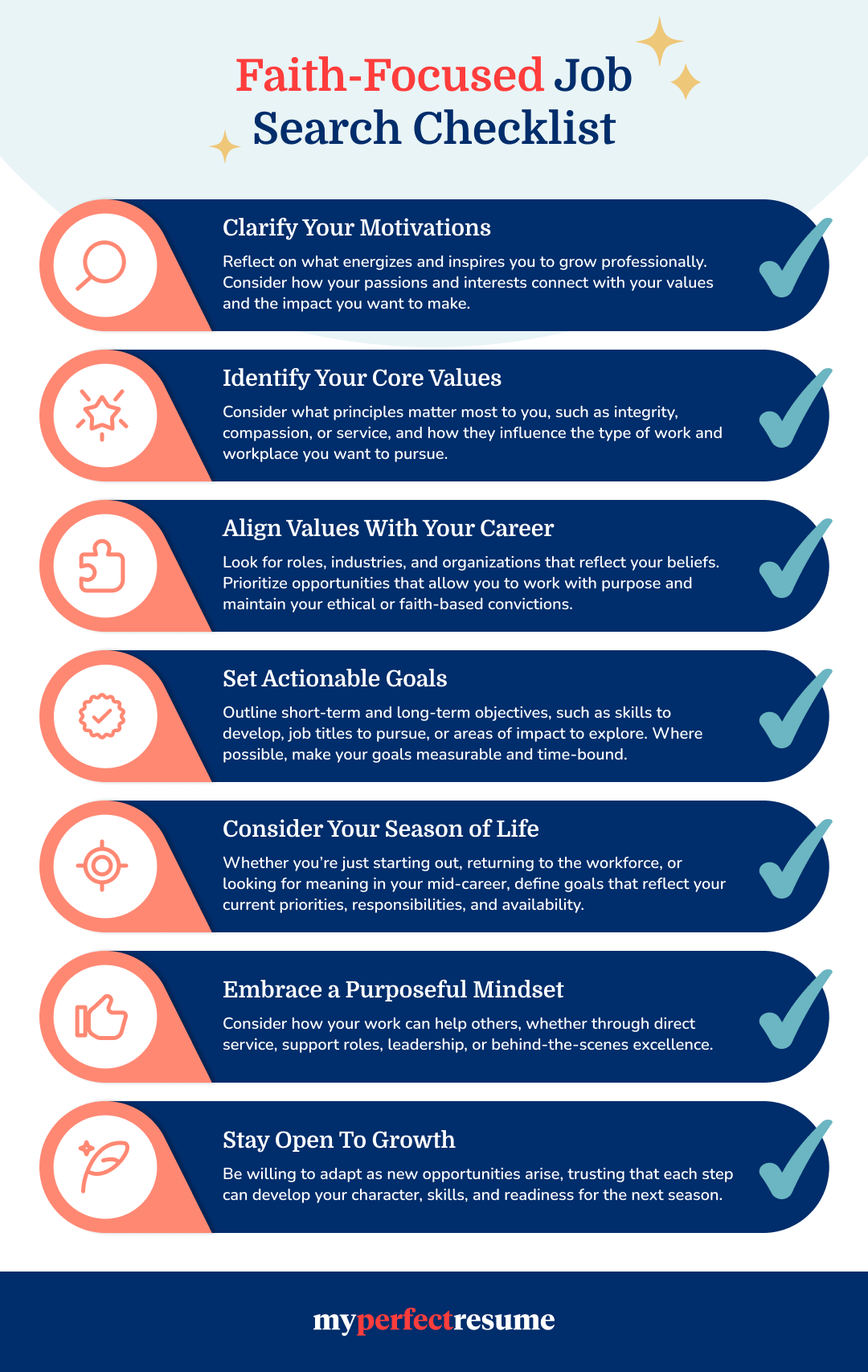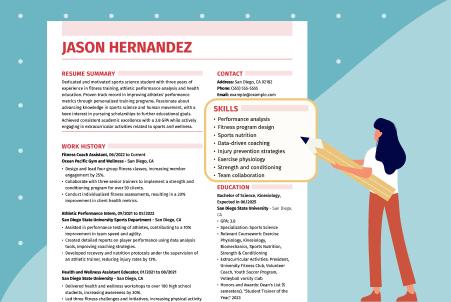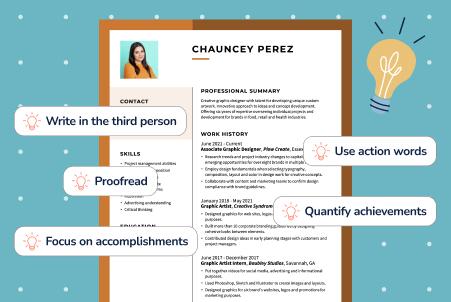Growing Your Career: Christian Resume & Job Search Handbook

Our customers have been hired at: *Foot Note
Table of Contents
Get started with MyPerfectResume today!
- Build a resume on any device
- Pick an ATS-friendly template
- Tailor with AI copy suggestions
Job searching as a Christian involves approaching every opportunity with intention, integrity, and a desire to align your work with your values and long-term goals.
Whether you’re a recent graduate or a seasoned professional, this guide offers essential tools and resources to help you pursue meaningful work in today’s competitive job market.
Explore tailored job search tips, from optimizing your resume for faith-based jobs to finding Christian companies to work for, preparing for interviews, and confidently negotiating job offers.
This guide is intended as a professional resource for individuals seeking employment opportunities with organizations that identify as faith-based or values-driven.
The content is designed to detail the perspectives of such organizations and is not intended to promote any specific doctrine, political viewpoint, or ideology.
The views and opinions expressed in job postings are solely those of the respective organizations or authors and do not necessarily reflect the views of MyPerfectResume.com.
All users—employers, job seekers, and contributors—are expected to comply with applicable local, state, and federal employment regulations, including those related to equal employment opportunity and non-discriminatory hiring practices.
Translating Faith-Based Experience Into Resume Value
Volunteering or working in a church setting can help you develop a wide range of transferable skills that are relevant to both faith-based and secular careers.
Whether you’ve led a worship group, managed budgets, or served in outreach programs, your experience has likely honed key skills such as communication, leadership, and management.
Explore examples below of how to include church experience on a resume for religious roles to showcase how your service has strengthened your skills and career readiness.
Leadership and management
Running church events, leading small groups, or coordinating volunteers demonstrates strong leadership ansd management experience.
Here are a few ways you can showcase leadership skills and experience on your resume:
- Coordinated a team of 20+ volunteers for weekly community outreach events.
- Oversaw logistics for seasonal church events with 500+ attendees.
- Led small group ministry, managing curriculum and group leaders.
Finance and budgeting
Whether you tracked donations, helped manage a ministry budget, or organized giving campaigns, these activities illustrate your attention to detail and accountability.
Here are some examples of related resume work history bullet points:
- Processed weekly giving and prepared monthly financial reports.
- Managed annual ministry budget of $10,000, allocating funds and tracking expenses.
- Led fundraising campaign that raised $15,000 for youth missions.
Teaching and communication
Leading Bible studies or youth groups highlights teaching skills and strong communication and public speaking abilities, which are assets in education, training, and customer-facing positions.
Here are a few examples of how you can list this experience on your resume:
- Developed and presented faith-based workshops on conflict resolution.
- Delivered weekly lessons to groups of 30+ teens.
- Regularly spoke at Sunday services and community events.
Community outreach and service
Service-focused roles like community outreach or mission trip planning can show valuable interpersonal skills and community engagement abilities.
For mission-driven or values-based organizations, consider subtly weaving in shared values or community involvement that reflects their culture.
This experience builds a strong case for your ability to manage programs, lead diverse teams, and serve others with professionalism and empathy. For example:
- Led annual mission trips for 15 people, raising over $10K and managing all logistics.
- Partnered with over five nonprofits to run food drives serving 2,000+ people annually.
- Launched refugee support program aiding 10+ families through housing and job prep.
Resume Examples for Christian Jobs
Below are professionally crafted resume examples for popular Christian jobs. You can use our AI Resume Builder to customize these examples and add your related skills and experience.
Senior pastor
This senior pastor resume example highlights key leadership, administrative, and pastoral care experience, demonstrating the ability to guide a congregation, oversee church operations, and foster community outreach with compassion and vision.
Parish administrator
The parish administrator resume above showcases strong communication skills and experience managing church operations, coordinating events, and supporting staff and congregation with professionalism and discretion.
Sunday school teacher
This Sunday school teacher resume highlights experience in faith-based education, lesson planning, and engaging children in spiritual development. It also demonstrates strong soft skills such as communication and classroom management.
Worship leader
Reference this worship leader resume to see how to highlight musical talent, team leadership, and spiritual guidance. This example demonstrates how to showcase technical skills, such as music software and multimedia integration for worship.
Religious affairs specialist
This religious affairs specialist resume highlights experience managing spiritual programs and providing counseling and support services. See our chaplain assistant resume example for an additional sample and tailored guidance.
Our library of customizable resume templates is an excellent resource for finding a template that matches your style.
Including Faith-Based Experience on Your Resume
It is important to consider the context of the role you are applying for when deciding whether or not to include faith-based or church-related experience on your resume.
When applying for a role at a faith-driven organization, you should include church-related experience because it directly supports your candidacy and demonstrates shared values.
However, including faith-based experience on a resume for non-religious roles or organizations can draw attention to personal details that may not be directly relevant to the position.
If your religious experience is a key part of your identity or central to the role you’re pursuing, consider including it throughout your resume, especially if it strengthens your candidacy.
Researching a company’s mission and values, as well as reading through the job description to understand what skills and experience are relevant to the role, can help you decide what, if any, religious experience you should include on your resume.- Toni Frana, Career Professional
How To Tailor Your Resume for Secular Roles
In secular or corporate work environments, explicitly religious job titles or language may unintentionally invite assumptions or create room for unconscious bias.
You can consider reframing your job titles and experience with neutral language to highlight your relevant professional qualifications rather than your specific religious affiliation.
For example, instead of "Youth Ministry Leader," you might write "Youth Program Coordinator" and describe the work in functional terms without emphasizing the religious context.
The goal is to highlight your strengths and marketable skills while aligning your experience with the tone and culture of the organization you're applying to.
Here are a few examples of how you can reframe faith-based experience for secular roles:
Resume Examples for Secular Roles
The samples below demonstrate various methods for including, omitting, or reframing religious experience on a resume for companies that are not affiliated with any particular religion.
Business operations manager
This example job seeker has prior experience as a ministry operations director, where they gained skills relevant to a business operations manager role.
To tailor their resume accordingly, they reframed their experience using neutral language, listing their job title as “Program Operations Manager” at a community-based nonprofit organization:
Program Operations Manager
Community-Based Nonprofit Organization, Riverside, CA
- Oversaw daily operations for a multi-departmental organization serving 500+ community members weekly.
- Managed budgeting, vendor relationships, and facility logistics, resulting in a 20% reduction in operating costs over two years.
- Supervised a cross-functional team of 15 staff and 60+ volunteers, implementing scheduling systems that improved retention and engagement.
Nonprofit administrator
This job seeker researched the nonprofit organization and discovered that its mission is rooted in faith-based community service.
Knowing this, they decided to include their previous church administrator role, emphasizing their relevant experience within a faith-based context.
The bullet points showcase key administrative skills, including scheduling daily operations, coordinating staff, and creating financial reports:
Church Administrator
Faith Community Church, Springfield, IL
- Managed daily operations for a 400-member congregation, including scheduling, facility maintenance, and staff coordination across five departments.
- Oversaw budgeting, accounting, and financial reporting for an annual operating budget of $250K, ensuring compliance and transparency.
- Coordinated 100+ annual events, including fundraisers, outreach programs, and educational workshops, handling logistics, promotion, and post-event evaluation.
Middle school teacher
This job seeker is applying for a teaching position. They have experience as a Sunday school teacher at their church and as a middle school teacher for the local public school.
They decided to leave their Sunday school experience off their resume because they have consistent, highly relevant experience as a public school teacher.
Outreach coordinator
This job seeker recently graduated from a Christian university. They included their degree, detailing coursework and extracurricular activities relevant to an outreach coordinator role:
Bachelor of Arts in Religious Studies
Liberty University, Lynchburg, VA
- Completed coursework in public speaking, nonprofit leadership, cross-cultural communication, and social media strategy.
- Led campus outreach events and coordinated volunteer efforts with local shelters and community programs.
- Capstone project: Developed a six-month outreach initiative for underserved urban communities, including program design, budgeting, and community partnership.
We recommend exploring our guide on writing a resume with no experience if you are a recent graduate or have a nonlinear work history.
Social worker
This job seeker has experience as a licensed clinical social worker. In between two of their roles, they spent time working as a pastoral counselor.
They decided to include their role as a pastoral counselor in their resume work history section because omitting it would create a gap in their experience.
To leave room to expand on more directly aligned positions, they used fewer bullet points to describe their experience as a pastoral counselor:
Pastoral Counselor & Care Coordinator
Grace Community Church, Denver, CO
- Supported individuals and families facing emotional and spiritual challenges, partnering with community organizations to connect them with additional social services.
Browse our professionally crafted resume examples to get inspired by samples tailored to various jobs, industries, and career levels.
How To Write a Job-Winning Resume
Regardless of the role you are applying for, it is essential to optimize your resume to align with employer expectations and demonstrate your strengths as a candidate.
Explore our tips and guidance below on how to write a resume that stands out to recruiters and hiring managers in your industry.
Use a professional resume format
A professional resume format helps you present your qualifications clearly and allows potential employers to quickly understand your experience and skills.
Avoid using excessive colors or graphics that could distract from the content. The goal is to ensure that your qualifications are easy to read.
Use clean resume-friendly fonts like Arial or Calibri, and ensure your sections are well-defined with clear headings.
Consistency in layout and spacing also contributes to a polished, professional appearance. Use equal margins and maintain consistent font sizes and styles throughout your resume.
Optimize for applicant tracking systems (ATS)
Many employers, including those at larger or medium-sized churches, use applicant tracking systems to scan resumes for keywords and qualifications related to the role.
Following ATS-friendly formatting best practices ensures that your resume is easily read by automated systems, increasing its chances of passing initial screenings.
Here are a few key tips on how to make an ATS-friendly resume that stands out:
- Use a simple, clean layout: Stick to standard fonts (like Arial, Calibri, or Times New Roman), and avoid columns, tables, and graphics, which can confuse ATS software.
- Incorporate keywords: Tailor your application to each job posting by including keywords in your resume that match the language in the job description.
- Include standard headings: Use conventional section titles like “work experience,” “education,” and “skills” so the ATS can easily categorize your information.
- Save your file as a Word document or PDF: Unless the job posting specifies otherwise, these formats are typically the safest for ATS compatibility.
You can use our ATS Resume Checker to scan your resume for common issues and get actionable suggestions to improve your resume score.
Tailor your resume to the role and company
Tailoring your resume shows employers that you’ve taken the time to understand what they’re looking for and how you can bring value to their team.
Generic resumes are often overlooked, especially by employers seeking candidates whose skills and experience align with their mission, values, and job requirements.
Writing a targeted resume shows employers that you’ve taken the time to understand the role and align your background with their needs, increasing your chances of landing an interview.
If you're applying to a faith-based organization or a company with a strong mission-driven focus, consider subtly weaving in values or experiences that align with their purpose.
If there are clear signs that a company values faith and religion, including religious experience would make sense. However, if there is no indication that faith and religion are part of the organization’s culture, emphasizing that experience is not required. Instead, focusing on the skills and experience you have as they relate to the role, outside of faith-based organizations, is the recommended way to approach your resume.- Toni Frana, Career Professional
Include a powerful resume summary
A well-crafted resume summary can immediately capture the attention of hiring managers and set the tone for the rest of your application.
This brief section (typically two to three sentences) highlights your most relevant qualifications, showcases your unique strengths, and reflects the values or skills that align with the role.
For faith-based or mission-driven organizations, your resume summary is an effective place to reflect shared values like leadership, service, or community impact. For example:
Experienced ministry coordinator with over five years of experience in spiritual mentorship, event planning, and team leadership. Adept at aligning operational strategies with organizational values and community needs. Committed to serving diverse populations through inclusive leadership and values-based engagement.
Highlight the skills employers are seeking
To stand out in a competitive job market, align your resume skills section with the specific skills and qualifications the employer values.
Start by carefully reviewing the job description and identifying the keywords and competencies mentioned—these are often the exact attributes ATS and hiring managers are scanning for.
Include hard skills (technical abilities specific to the role) and soft skills (personal traits that influence how you work with others). Back these up with examples from your experience.
You can use our AI Resume Skills Generator to instantly create a personalized skills section tailored to your existing or target job title:
AI Resume Skills Generator

Focus on measurable achievements
Rather than simply listing responsibilities, use your resume to highlight quantifiable accomplishments—concrete examples that show the impact of your work.
For example, instead of “Organized community events,” you could say: “Coordinated 10+ community outreach events annually, increasing volunteer participation by 35%.”
This approach helps hiring managers see your value by showcasing tangible contributions with clear metrics, percentages, or other measurable outcomes.
How To Create a Strong Cover Letter
We’ve detailed essential strategies below on writing a cover letter that effectively showcases how your experience aligns with the role you are applying for.
Start with a compelling opening
The opening of your cover letter is your first opportunity to grab the hiring manager's attention and demonstrate your enthusiasm for the role.
A compelling opening could include a brief anecdote, a statement about your passion for the industry, or a recognition of the company’s impact that speaks directly to your experience.
Explore unique strategies for starting a cover letter to see examples that can help you stand out and immediately showcase your value.
When discussing your values in your cover letter, focus on how they influence your work ethic, decision-making, and relationships, emphasizing integrity and accountability.
Highlight your top strengths
Focus on the skills most relevant to the role you're applying for. Carefully review the job description to identify key competencies, and match your strengths to these requirements.
Frame values like integrity, service, and perseverance in workplace-relevant terms like “reliability,” “accountability,” “commitment,” and “collaboration.” For example:
“Known for my reliability and attention to detail, I consistently ensure high standards in both team and client-facing work.”
You can share examples of how your values have guided you through challenges, helped you lead a team, or motivated you to contribute to your community. For example:
“My commitment to service has led me to build strong community partnerships that resulted in a 40% increase in event participation over two years.”
Connect your values to hard skills and soft skills relevant to the role to ensure the focus is on the qualities that help you excel in the workplace.
End with enthusiasm and a clear call to action
The closing of your cover letter is just as important as the opening. It’s your final chance to make a strong impression and express genuine enthusiasm for the role.
When you end your cover letter with a purposeful, confident closing, you signal that you’re excited about the opportunity and ready to take the next step. For example:
“I’m excited about the opportunity to contribute my background in outreach and community-building to your mission-driven team. I would welcome the chance to speak further about how I can support your goals and help make a meaningful impact.”
Explore our library of cover letter examples to see samples tailored to various job titles, industries, and career stages.
Cover Letter Examples for Christian Jobs
The samples below demonstrate how to customize your cover letter for Christian roles. You can edit them directly in our Cover Letter Generator to easily create your personalized cover letter.
Minister of music
This minister of music cover letter effectively showcases the job seeker’s passion for worship, musical expertise, and leadership experience guiding worship teams. It demonstrates a deep commitment to fostering a spiritually enriching environment for congregants.
Youth director
The youth director cover letter above follows best practices for cover letter formatting, ensuring clarity and professionalism. It highlights the job seeker’s experience organizing impactful programs and fostering a supportive and faith-based environment.
Campus minister
This campus minister cover letter demonstrates the job seeker’s passion for ministry and their qualifications for supporting spiritual life on a college campus. It highlights experience in student outreach, event planning, and fostering a supportive, faith-centered learning environment.
We have a library of matching resume and cover letter templates to help you create a polished and cohesive job application.
How To Follow Up on a Job Application
A thoughtful follow-up after you apply for a role demonstrates your professionalism and interest in the job. Explore how to follow up on a job application below to get started.
Give it time
Wait at least one to two weeks after submitting your application before following up with the employer. This allows them time to review applications and begin their selection process.
Find the right contact
If possible, send your follow-up email directly to the hiring manager or recruiter. Look for their contact information in the job posting, company website, or LinkedIn.
Be polite and professional
Your tone should be respectful and appreciative. Keep the message brief and to the point. Here is an email template that you can use for following up on a job application:
Subject line: Following Up on [Job Title] Application
Dear [Hiring Manager's Name],
I hope this message finds you well. I recently applied for the [job title] position and wanted to express my continued interest.
I’m excited about the opportunity to bring my [key skill or experience] to your team. Please let me know if there’s any additional information I can provide.
Thank you for your time and consideration.
Best regards,
[Your Name]If you haven’t received a response after a week or two, shift your focus to other opportunities while keeping the door open for future communication.
Defining Your Job Search Goals and Objectives
Defining your goals and objectives as a Christian job seeker involves identifying your professional aspirations while aligning them with your faith and values.
Establishing clear, measurable goals for the immediate future and long-term career progression helps you stay focused, track your growth, and make informed decisions.
The following checklist is designed to kickstart your brainstorming session and help you reflect on your job search goals through both a professional and values-based lens:
How To Find Christian Jobs
Several platforms and strategies can help connect you with faith-based opportunities at Christian-affiliated or faith-aligned organizations. Explore tips and resources below.
Explore job boards
Online job boards and platforms can help connect candidates with Christian employers, ministries, and mission-driven organizations. Here's where to begin your search.
FlexJobs
Our sister company, FlexJobs, is a popular job board that specializes in remote, hybrid, part-time, and flexible job opportunities across a wide range of industries.
While it’s not faith-specific, it’s a valuable resource for job seekers looking for mission-aligned work environments or greater work-life balance that supports personal commitments.
Explore remote work-from-home Christian jobs to find verified remote Christian jobs. FlexJobs updates listings daily with curated opportunities from reputable employers.
ChristianJobs.com
ChristianJobs.com is a dedicated job board that connects faith-driven job seekers with Christian employers across a variety of industries.
From ministry and nonprofit roles to positions in education, healthcare, and business, the site offers opportunities for those looking to integrate their faith into their work.
ChurchStaffing.com
ChurchStaffing.com is an online platform dedicated to connecting faith-driven professionals with ministry and church employment opportunities.
It serves as a comprehensive resource for both job seekers and churches looking to hire, with a focus on church leadership, worship, youth, and pastoral positions.
Leverage your church network
Some churches offer job boards, career counseling ministries, or networking events. These are excellent resources to explore opportunities that align with your values.
Volunteering for administrative, outreach, or event planning roles can highlight your skills to others and may organically lead to professional conversations or opportunities.
Approach networking with a spirit of service and authenticity. Express appreciation for guidance or referrals, and be open to returning the favor for others in your network.
Explore our expert job search tips and strategies for help standing out, staying motivated, and navigating your search with clarity, confidence, and purpose.
Faith-Aligned Companies
When looking for meaningful work that aligns with your values, it can be helpful to explore companies and organizations with missions rooted in service, integrity, and purpose.
Whether you're seeking Christian companies to work for or employers that emphasize ethical leadership and community impact, there is a wide range of opportunities available.
Tyson Foods
Tyson Foods is one of the world’s largest food companies, known primarily for producing chicken, beef, and pork products.
Founded on strong ethical and faith-influenced principles, the company has historically emphasized integrity, sustainability, and a commitment to community well-being.
eHarmony
eHarmony is an online dating platform founded in 2000 by clinical psychologist and Christian theologian Dr. Neil Clark Warren.
It was initially launched to help people build long-term, meaningful relationships rooted in compatibility and shared values.
eHarmony has since expanded its reach to a broader audience while maintaining its reputation for serious, relationship-oriented matchmaking.
In-N-Out Burger
In-N-Out Burger is a popular American fast-food chain known for its fresh ingredients, simple menu, and strong company values.
Founded in 1948, the company has deep Christian roots, which are reflected in small details like Bible verse references on packaging.
In-N-Out is also recognized for treating employees well and maintaining a strong commitment to quality and service.
Mission-Driven Organizations
If you're looking to align your career with a greater purpose, mission-driven organizations can offer meaningful opportunities that focus on service, community impact, and social responsibility.
These organizations are guided by values such as service, compassion, and community impact, making them an excellent fit for those seeking to make a difference through their work.
Habitat for Humanity
Habitat for Humanity is a global nonprofit organization dedicated to building and improving homes for individuals and families in need.
Founded on Christian principles, it brings people together to create affordable housing solutions, promote community development, and run volunteer-driven construction projects.
Habitat for Humanity partners with homeowners, volunteers, and donors to help build strength, stability, and self-reliance through shelter.
The Salvation Army
The Salvation Army is a global Christian nonprofit organization dedicated to serving individuals and communities through a wide range of social services.
Founded in 1865, it offers support such as food assistance, disaster relief, rehabilitation programs, and shelter for the homeless.
Grounded in faith, The Salvation Army combines spiritual ministry with practical help, aiming to meet human needs without discrimination.
Samaritan’s Purse
Samaritan’s Purse is a Christian humanitarian organization that provides emergency relief, medical aid, and development assistance to people in need around the world.
Founded in 1970, it responds to crises such as natural disasters, war, and poverty while sharing a message of hope through faith-based outreach.
Its well-known programs include disaster response, Operation Christmas Child, and international medical missions.
How to Prepare for Job Interviews
Job interviews allow you to showcase your strengths, demonstrate your enthusiasm for the role, and ask questions to determine if the job and organization align with your goals.
Explore tips on how to prepare for an interview below to learn how to confidently discuss your skills and experience with potential employers.
Research the organization and role
Research the company or organization’s mission, values, and work culture. Explore their website and social media channels to familiarize yourself with recent news or achievements.
This preparation not only helps you tailor your responses to reflect what the employer is looking for but also shows your genuine interest and initiative.
It can also boost your confidence during interviews, as you'll be better equipped to engage in meaningful conversations about the company and the role.
Plan for multiple interview formats
Interviews can take many forms, so it’s important to prepare accordingly. Here are a few tips to follow for common interview formats:
- Phone interviews: Find a quiet space, use a reliable phone line, and keep a copy of your resume in front of you for reference.
- Video interviews: For a successful video interview, test your camera and microphone beforehand, dress professionally, and ensure your background is free from distractions.
- In-person interviews: Arrive early, bring printed copies of your resume, and be ready to engage face-to-face with confidence and professionalism.
- Panel interviews: Make eye contact with each panelist, address them by name when possible, and aim to connect your responses to different areas of the organization.
Practice common interview questions
Preparing answers to common interview questions can help you speak with clarity and confidence during your interview.
While every role is different, many employers ask similar foundational questions to understand your background, strengths, and fit for the team.
Below are a few examples of common behavioral interview questions and sample answers.
"Why do you want to work here?"
"Tell me about a time when you overcame a challenge."
"Tell me about a time you worked as part of a team."
We have a variety of interview prep tools and resources to help you feel confident and ready for any interview.
Prepare to discuss any employment gaps
If there are any employment gaps in your resume, prepare to discuss them during the interview if the interviewer asks.
Whether the break was for caregiving, education, health, mission work, or personal growth, be truthful while framing it in a way that shows resilience and intentional decision-making.
Highlight how you stayed active, learned new skills, or contributed meaningfully during the gap. This shows you remained growth-minded and engaged. For example:
"During my break, I volunteered for a local nonprofit, leading community outreach efforts and strengthening my communication and leadership skills."
Avoid dwelling on the gap or going into unnecessary detail. Instead, pivot to what you learned, how you prepared to reenter the workforce, and what you’re ready to bring to the role.
Consider questions to ask the interviewer
Come prepared with thoughtful questions about the organization’s culture and mission and how it supports employees' personal and professional growth.
This is an opportunity to show your interest and enthusiasm for the role. Here are a few examples of questions that you can ask the interviewer:
- "What would you like to see accomplished in the first 90 days of this position?"
- "Can you share how the organization integrates its values into the workplace?"
- "How does the organization support collaboration and communication?"
- "What qualities have made previous team members in this role successful?"
- "What are the most pressing challenges your team is currently facing?"
Send a thoughtful follow-up email after your interview to express appreciation, reinforce your interest in the role, and restate how your strengths align with the company’s needs.
Tips for Building a Strong Personal Brand
- Define your core values: Take time to think about what motivates you to continue learning and growing in your career. Whether it’s integrity, service, or leadership, aligning your brand with these values will help you stay authentic in interviews and networking.
- Showcase your expertise: Use platforms like LinkedIn or personal blogs to share your insights and professional accomplishments. For example, if you’re a leader in faith-based initiatives, share resources or initiatives that align with your mission.
- Align your messaging: Ensure your resume, Bold.pro profile, and other online profiles consistently reflect your strengths, experience, and values. This presents a cohesive narrative that aligns with the roles you're pursuing and reinforces your brand.
- Network strategically: Building your brand also involves connecting with people who share your values. Attend industry events, join online communities, and engage in conversations that reflect your goals and passions.
Evaluating and Negotiating Job Offers
Receiving a job offer is an exciting milestone, but before you say yes, evaluate the offer to ensure the role aligns with your career goals, values, and lifestyle needs.
Start by reviewing the full compensation package, not just the salary. Consider health insurance, retirement contributions, paid time off, and additional perks.
Be sure the day-to-day responsibilities of the role align with your strengths and long-term goals, and remember not to overlook practical factors like location, commute, or remote flexibility.
If the offer is promising but could be stronger, you can negotiate it respectfully. Come prepared with research on industry standards and know the value you bring to the role. For example:
While salary is important, you can also discuss benefits like flexible scheduling, extra vacation time, or funds for continued education.
Approach the conversation professionally and confidently, and once terms are agreed upon, always request the final offer in writing.
Building a Successful Career and Excelling in the Workplace
Success in your career isn't just about securing the right position—it’s about how you show up, grow, and contribute over time.
Whether you’re just starting out or transitioning into a new role, consistently demonstrating a strong work ethic, emotional intelligence, and a willingness to learn will set you apart.
Focus on building meaningful relationships, seeking mentorship, and staying open to feedback. Look for roles that align with your values and offer development opportunities.
When you bring integrity, purpose, and excellence into your work, you not only thrive professionally but also make a lasting impact on the people and communities you serve.
Key Takeaways
- Align your career with your values: Choose opportunities that reflect your principles, seeking roles where you can live out your values of integrity, service, and purpose.
- Tailor your resume and cover letter thoughtfully: Use clear, results-driven language to highlight your experience and tailor your skills to the role you are applying for.
- Research companies that reflect your beliefs: Explore employers known for ethical practices, positive workplace culture, or Christian foundations.
- Prepare for interviews confidently: Practice sharing your experiences professionally and authentically, emphasizing how your background aligns with the role.
- Negotiate job offers strategically: Research to set salary expectations and negotiate respectfully, keeping your long-term goals and values in mind when evaluating offers.
- Commit to growth: By aligning your work with your values and striving for excellence in every role, you lay the foundation for long-term fulfillment and impact in the workplace.
How we reviewed this article
Since 2012, we have helped more than 11 million job seekers. We want to make your career journey accessible and manageable through our services and Career Center’s how-to guides and tips. In our commitment to bring you a transparent process, we present our Editorial Process.
Our customers have been hired at:*Foot Note















